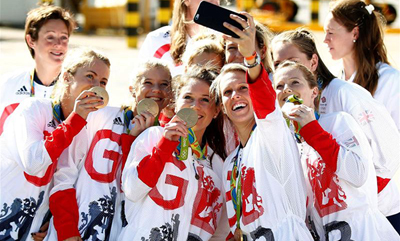EXCLUSIVE: The Team GB comms plan
September 5, 2016
The Olympic Games in Rio brought an unheralded level of success for Great Britain and the British Olympic Association, with their biggest ever away Games medal haul, seeing them finish second in the medal table.
While the athletes made the headlines with their performances, managing the comms of the record breaking GB team was Scott Field, who spoke exclusively to iSportconnect at the Media and Comms Masterclass, about the communications plan that was put in place for the Games.
iSC – Scott, congratulations on a hugely successful Olympic Games. The BOA must be delighted with how things went in Rio.
SF – ‘It was great. All credit to the athletes, there were some magnificent individual and team performances in Rio. It was a challenging environment, and an away Games, we’d always targeted it to be our best ever away Games, beating the 47 medals won in Beijing in 2008. To actually beat the London haul of 65 was quite incredible. It meant we were the first Olympic nation in the history of the Games to better their home medal haul. To get 67 medals was just incredible, it was a wonderful two weeks of sport and some incredible memories to take away from Rio.’
iSC – Being a comms director must be a lot easier when the team is winning!
SF – “Winning does make my job easier, there’s no doubt about that! What it does allow you to do is to roll out the incredible backstories that each of the athletes have. It’s a great help, it does make life much easier when you’re engaging with the media, naturally there’s great interest there. You have to harness that interest and enthusiasm from the athletes as well and ensure those stories can be told in the most constructive way. It also makes for a lot of work as well, you are trying to facilitate more and more media coverage, be it from international media or national media.”

iSC – Tell us what the communication strategy was for Team GB?
SF – “The media strategy was multifaceted, that’s the interesting part about it. We had a great digital strategy and social strategy that sat behind us going into Rio. We had a very internally focussed messaging strategy about how we wanted to approach Rio and how we wanted to portray ourselves going into the country and whilst we were out there. We had strategies to engage with sports and their press officers, and a strategy for the written and traditional media. We had a strategy for winning, which was called ‘Managing Victory’, which was about taking athletes around rights holding and non-rights holding broadcasters to maximise success. We naturally had a very strong relationship with the BBC. All these things come together atone point in time. But overarching at the top of it all we had a philosophy,which was we wanted to be an open national Olympic committee, that we wanted to have great relationships across the board, be that with our own media or be that with stakeholders.”
iSC – Many people commented after GB’s success at the Games, on how important the lottery has become to British sport. How crucial is that relationship?
SF – “The partnership that the lottery has with UK Sport, the government and the BOA is absolutely crucial. It is a really important part. I would say, not just focussing on the lottery, it’s critical to shine a light on all our partners. The BOA is one of only four Olympic committees in the world that’s completely independently funded. In terms of that, exposing the work our partners do, the great relationships we have with them, the investment they make in UK sport, is really critical.”
{jcomments on}



